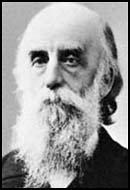Lyman Abbott

Lyman Abbott, the son of Jacob Abbott, the professor of mathematics at Amherst College, was born in Roxbury, Massachusetts, on 18th December, 1835. During his childhood he lived in Farmington, Maine.
Abbott graduated from New York University (1853) he worked as a lawyer before studying theology. Ordained in 1860 he served as a pastor and edited the Illustrated Christian Union (1870-76), The Christian Union (1876-93), where he replaced Henry Ward Beecher, as the editor of The Outlook (1893-1922).
After the death of Beecher in 1890 he replaced him as the pastor of the Plymouth Congregational Church in Brooklyn. Abbott took a keen interest in social problems and wrote several books including The Evolution of Christianity (1896), Christianity and Social Problems (1897), The Rights of Man (1901), The Christian Ministry (1905), The Personality of God (1905), Industrial Problems (1905), Christ's Secret of Happiness (1907), The Home Builder (1908), The Temple (1909), The Spirit of Democracy (1910), America in the Making (1911), Letters to Unknown Friends (1913), Reminiscences (1915), The Twentieth Century Crusade (1918) and What Christianity Means to Me (1921).
Lyman Abbott died in New York City on 22nd October, 1922, and was buried in the New Windsor Cemetery in Cornwall-on-Hudson.
Primary Sources
(1) Lyman Abbott, The Outlook (22nd February, 1902)
Anarchism is defined by E. V. Zenker as: "the perfect, unfettered self-government of the individual, and consequently the absence of any kind of external government." It rests upon the doctrine that no man has a right to control by force the action of any other man. Anarchism is defended on historic grounds: the evils are recited which have been wrought in human history by the employment of force compelling obedience by one will to another will, as they are seen in political and religious despotism and in the subjugation of women.
Anarchism is defended on religious grounds. Jesus Christ is cited as the first of anarchists; for did he not say, "Resist not evil: if one take away thy coat, give him thy cloak also; and if one smite thee upon the one cheek, turn to him the other also? What is this, we are asked, but a denial of the right to use force even in defense of one's simplest and plainest rights?
Socialism, which is curiously confounded by the indiscriminating with anarchism, is its exact opposite. Anarchy is the doctrine that there should be no government control; socialism is the doctrine that the government should control everything.
The place in which to attack anarchism is where the offences grow which alone make anarchism possible. Let us secure the just, speedy, and impartial administration of law; let us elect legislators who seek honestly to conform human legislation to the divine laws of the social order, without fear or favour. The way to counteract hostility to law is to make laws which deserve to be respected.
